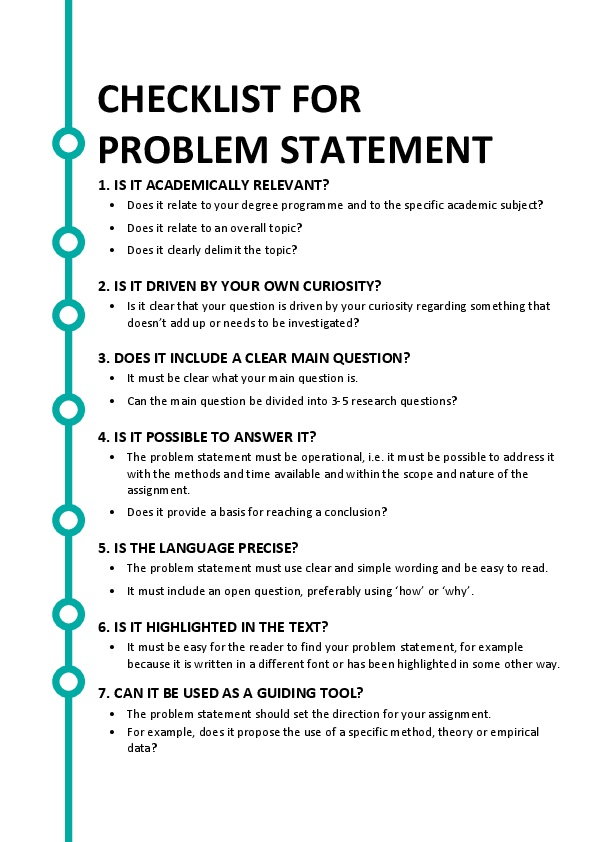Aarhus University logo

AU Studypedia

Problem statement and hypothesis
A problem statement may need to be re-worked throughout the process .
The academic problem that you are investigating in your assignment can either take the form of a problem statement, i.e. a question that you want to answer, or it can be a hypothesis that you wish to reject or confirm. How you formulate the problem influences the task you are embarking on. Problem statements as well as hypotheses must be relevant to your area of study, and you must be able to carry out the investigation using the resources and methods available to you.
Note that a problem statement or a hypothesis often changes during the writing process. Sometimes you have to change the focus of the problem statement/hypothesis, and sometimes you only have to change a single word. The amount of changes required depends on your study programme and the assignment at hand. Therefore, you should always ask your teacher or supervisor for advice.
Problem statement
A problem statement usually consists of one question to be addressed in your assignment and to be answered in your conclusion. It can include 2-5 sub-questions. A problem statement can take different forms, but generally:
It uses accurate wording, for example technical terms
It relates specifically to your project, describing what you want to study (object) and how you want to study it (theories and methods)
It not only introduces a description of the problem (what is the problem?) but also encourages explanation, reflection and discussion of the problem (how and why does the problem exist?)
The problem statement as a guiding tool
The problem statement can be a useful tool to guide you through your work process. Whether you are collecting empirical data, searching for literature or reading, always keep your problem statement in mind. This will help you narrow down your searches and your reading, and help you focus on what is relevant in order to answer the question in your problem statement.
You should also be prepared to revise your problem statement as you go along. For example if you discover a more relevant or interesting question when you start working on the investigation. Always discuss with your teacher or supervisor if you want to make radical changes to your problem statement, and thereby to your assignment.
Working on your problem statement
The problem statement sets the framework for your assignment .
Your problem statement asks the question that will be answered in the conclusion. The actual assignment - between the problem statement and the conclusion - addresses your main question. There must be a clear link between the problem statement and the conclusion.
A problem statement must comply with certain specific requirements
Your problem statement has to meet a number of formal requirements, but there are other elements that you need to consider as well. For example: Is your language clear and unambiguous, and is your topic relevant and interesting?
Checklist for the problem statement
Checklist for the problem statement .
Use the points in the checklist below to assure the quality of your problem statement. Tick off each of the points that your problem statement complies with. Continue to work on your problem statement until it complies with most or all of the items on the list. This will help you make sure that your problem statement is satisfactory.

The checklist has been prepared by the editorial team in collaboration with Susanne Højlund, associate professor at the School of Culture and Society - Department of Anthropology, Aarhus University.
A hypothesis is a theoretical, hypothetical explanation that can be tested. It usually takes the form of a causal relationship or a causal explanation. You can also consider the hypothesis as a preliminary response to a research question or a problem statement. A hypothesis can be expressed in different ways, but generally, the following applies:
The hypothesis is theoretical and builds on existing knowledge and general principles.
The hypothesis can be tested through a study or an experiment.
The hypothesis can either be confirmed or rejected.
Testing a hypothesis
Your hypothesis can include a prediction of the results of your study based on a logical explanation. Your study will then show whether your hypothesis and your prediction appear to be correct or not. In other words, a good hypothesis is a hypothesis that you can test through a study or an experiment.
A good hypothesis is theoretical and is based on existing knowledge, general principles and previous research within a similar academic problem area. It can also be a good idea to consider proposing several hypotheses.
In science, it is generally believed that a hypothesis can turn out to be wrong, but that it can never be conclusively proven to be true. Consequently, your study or experiment should be designed so that it attempts to reject or falsify your hypothesis. If you fail to reject the hypothesis, it is more likely to be "correct".
Inspiration from assignments by other students
Get a list of thesis titles from your field of study, and draw inspiration from other students’ problem statements.

PSC 352: Introduction to Comparative Politics
- Getting Started
- Comparative Politics Overview
- Current World/Political News Feeds
- Choose a country

What is the difference between a thesis & a hypothesis?
- Find Books/eBooks
- Find Articles, Reports & Documents
- Find Statistics
- Find Poll & Survey Results
- Evaluate Your Sources
- Cite Your Sources
B oth the hypothesis statement and the thesis statement answer the research question of the study. When the statement is one that can be proved or disproved, it is an hypothesis statement. If, instead, the statement specifically shows the intentions/objectives/position of the researcher, it is a thesis statement.
A hypothesis is a statement that can be proved or disproved. It is typically used in quantitative research and predicts the relationship between variables.
A thesis statement is a short, direct sentence that summarizes the main point or claim of an essay or research paper. It is seen in quantitative, qualitative, and mixed methods research. A thesis statement is developed, supported, and explained in the body of the essay or research report by means of examples and evidence.
Every research study should contain a concise and well-written thesis statement. If the intent of the study is to prove/disprove something, that research report will also contain an hypothesis statement.
Jablonski , Judith. What is the difference between a thesis statement and an hypothesis statement? Online Library. American Public University System. Jun 16, 2014. Web. http://apus.libanswers.com/faq/2374
Let’s say you are interested in the conflict in Darfur, and you conclude that the issues you wish to address include the nature, causes, and effects of the conflict, and the international response. While you could address the issue of international response first, it makes the most sense to start with a description of the conflict, followed by an exploration of the causes, effects, and then to discuss the international response and what more could/should be done.
This hypothetical example may lead to the following title, introduction, and statement of questions:
Conflict in Darfur: Causes, Consequences, and International Response This paper examines the conflict in Darfur, Sudan. It is organized around the following questions: (1) What is the nature of the conflict in Darfur? (2) What are the causes and effects of the conflict? (3) What has the international community done to address it, and what more could/should it do?
Following the section that presents your questions and background, you will offer a set of responses/answers/(hypo)theses. They should follow the order of the questions. This might look something like this, “The paper argues/contends/ maintains/seeks to develop the position that...etc.” The most important thing you can do in this section is to present as clearly as possible your best thinking on the subject matter guided by course material and research. As you proceed through the research process, your thinking about the issues/questions will become more nuanced, complex, and refined. The statement of your theses will reflect this as you move forward in the research process.
So, looking to our hypothetical example on Darfur:
The current conflict in Darfur goes back more than a decade and consists of fighting between government-supported troops and residents of Darfur. The causes of the conflict include x, y, and z. The effects of the conflict have been a, b, and c. The international community has done 0, and it should do 1, 2, and 3.
Once you have setup your thesis you will be ready to begin amassing supporting evidence for you claims. This is a very important part of the research paper, as you will provide the substance to defend your thesis.
- << Previous: Choose a country
- Next: Find Books/eBooks >>
- Last Updated: Sep 13, 2024 2:35 PM
- URL: https://libguides.mssu.edu/PSC352
This site is maintained by the librarians of George A. Spiva Library . If you have a question or comment about the Library's LibGuides, please contact the site administrator .

- Customer Reviews
- Extended Essays
- IB Internal Assessment
- Theory of Knowledge
- Literature Review
- Dissertations
- Essay Writing
- Research Writing
- Assignment Help
- Capstone Projects
- College Application
- Online Class
Research Questions vs Hypothesis: What’s The Difference?
0 Comments
by Antony W
July 30, 2024

You’ll need to come up with a research question or a hypothesis to guide your next research project. But what is a hypothesis in the first place? What is the perfect definition for a research question? And, what’s the difference between the two?
In this guide to research questions vs hypothesis, we’ll look at the definition of each component and the difference between the two.
We’ll also look at when a research question and a hypothesis may be useful and provide you with some tips that you can use to come up with hypothesis and research questions that will suit your research topic .
Let’s get to it.
What’s a Research Question?
We define a research question as the exact question you want to answer on a given topic or research project. Good research questions should be clear and easy to understand, allow for the collection of necessary data, and be specific and relevant to your field of study.
Research questions are part of heuristic research methods, where researchers use personal experiences and observations to understand a research subject. By using such approaches to explore the question, you should be able to provide an analytical justification of why and how you should respond to the question.
While it’s common for researchers to focus on one question at a time, more complex topics may require two or more questions to cover in-depth.
When is a Research Question Useful?
A research question may be useful when and if:
- There isn’t enough previous research on the topic
- You want to report a wider range out of outcome when doing your research project
- You want to conduct a more open ended inquiries
Perhaps the biggest drawback with research questions is that they tend to researchers in a position to “fish expectations” or excessively manipulate their findings.
Again, research questions sometimes tend to be less specific, and the reason is that there often no sufficient previous research on the questions.
What’s a Hypothesis?
A hypothesis is a statement you can approve or disapprove. You develop a hypothesis from a research question by changing the question into a statement.
Primarily applied in deductive research, it involves the use of scientific, mathematical, and sociological findings to agree to or write off an assumption.
Researchers use the null approach for statements they can disapprove. They take a hypothesis and add a “not” to it to make it a working null hypothesis.
A null hypothesis is quite common in scientific methods. In this case, you have to formulate a hypothesis, and then conduct an investigation to disapprove the statement.
If you can disapprove the statement, you develop another hypothesis and then repeat the process until you can’t disapprove the statement.
In other words, if a hypothesis is true, then it must have been repeatedly tested and verified.
The consensus among researchers is that, like research questions, a hypothesis should not only be clear and easy to understand but also have a definite focus, answerable, and relevant to your field of study.
When is a Hypothesis Useful?
A hypothesis may be useful when or if:
- There’s enough previous research on the topic
- You want to test a specific model or a particular theory
- You anticipate a likely outcome in advance
The drawback to hypothesis as a scientific method is that it can hinder flexibility, or possibly blind a researcher not to see unanticipated results.
Research Question vs Hypothesis: Which One Should Come First
Researchers use scientific methods to hone on different theories. So if the purpose of the research project were to analyze a concept, a scientific method would be necessary.
Such a case requires coming up with a research question first, followed by a scientific method.
Since a hypothesis is part of a research method, it will come after the research question.
Research Question vs Hypothesis: What’s the Difference?
The following are the differences between a research question and a hypothesis.
We look at the differences in purpose and structure, writing, as well as conclusion.
Research Questions vs Hypothesis: Some Useful Advice
As much as there are differences between hypothesis and research questions, you have to state either one in the introduction and then repeat the same in the conclusion of your research paper.
Whichever element you opt to use, you should clearly demonstrate that you understand your topic, have achieved the goal of your research project, and not swayed a bit in your research process.
If it helps, start and conclude every chapter of your research project by providing additional information on how you’ve or will address the hypothesis or research question.
You should also include the aims and objectives of coming up with the research question or formulating the hypothesis. Doing so will go a long way to demonstrate that you have a strong focus on the research issue at hand.
Research Questions vs Hypothesis: Conclusion
If you need help with coming up with research questions, formulating a hypothesis, and completing your research paper writing , feel free to talk to us.
About the author
Antony W is a professional writer and coach at Help for Assessment. He spends countless hours every day researching and writing great content filled with expert advice on how to write engaging essays, research papers, and assignments.
